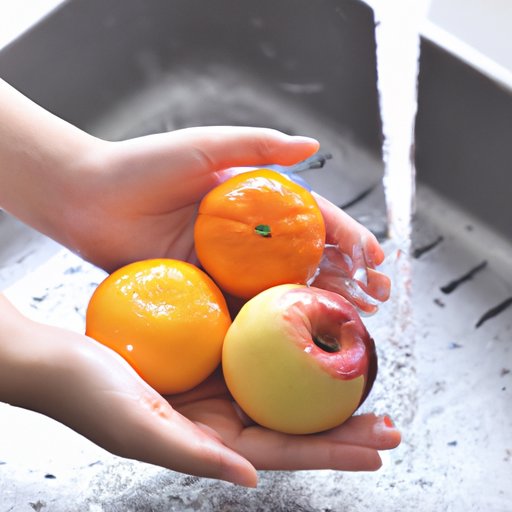
Introduction
Do you wash your fruit before eating it? If not, you should be. Washing fruit is an essential step towards reducing your risk of illness and keeping your family safely snacking. In this ultimate guide to washing fruit, we’ll explore why it’s important to wash your fruit, how to do it effectively, and common mistakes to avoid. Get ready to become a fruit-washing pro!
The Ultimate Guide to Washing Fruit: Tips and Tricks for a Safer, Healthier Snack
Washing fruit is a practice that dates back centuries. While the methods and tools may have changed over time, the importance of washing fruit remains the same. Proper washing can help to remove harmful contaminants such as bacteria, dirt, and pesticides, reducing the risk of illness and promoting a safer snack time.
So, what are some tips and tricks for effective fruit washing? Let’s dive in.
5 Easy Steps to Wash Your Fruit and Remove Harmful Bacteria
To effectively wash your fruit, follow these five easy steps:
- Rinse your fruit under cool, running water
- Gently scrub the surface of your fruit with a clean brush or your hands
- Rinse your fruit again under cool, running water
- Dry your fruit with a clean towel or paper towel
- Discard any damaged or bruised fruit
It’s important to note that each of these steps serves a specific purpose. Rinsing the fruit under cool, running water helps to remove any dirt or debris. Gently scrubbing helps to remove any contaminants that may be lingering on the surface. Rinsing again helps to remove any residue left over from scrubbing. Drying the fruit helps to remove any excess moisture that may promote bacterial growth, and discarding damaged or bruised fruit helps to prevent the spread of any contaminants.
For stubborn dirt or bacteria on certain types of fruit (such as berries), soaking in a vinegar solution can be effective. Mix one part vinegar with three parts water, and soak the fruit for five minutes before rinsing and drying.
Fruit Cleaning 101: Everything You Need to Know to Keep Your Family Safe
When it comes to cleaning fruit, it’s important to understand the different types of contaminants that can be present. These can include bacteria, viruses, parasites, and even chemical residues from pesticides.
However, different types of contaminants require different cleaning methods. Generally speaking, washing with cool, running water is effective for removing dirt and bacteria. For chemical residues, washing with a mixture of water and baking soda may be effective.
After washing your fruit, it’s important to store it properly to prevent the growth of any remaining bacteria. Store fresh fruit in the refrigerator, and use it within a few days. Discard any fruit that begins to spoil or show signs of mold.
Washing Fruit to Protect Your Health: An Essential Guide
The risks of eating unwashed fruit can be significant. Contaminated fruit can lead to illnesses such as E. coli, salmonella, and listeria. However, washing your fruit can greatly reduce your risk of falling ill.
Washing your fruit can remove up to 90 percent of bacteria and other contaminants, making it a simple but effective way to promote a healthier snack time. To ensure the maximum benefit, make sure to follow the proper washing steps and store your fruit correctly.
The Do’s and Don’ts of Washing Fruit: How to Do It Right
While washing fruit may seem simple, there are some common mistakes that can reduce its effectiveness. These include:
- Not washing your hands before washing the fruit
- Using soap or detergent on your fruit
- Not drying your fruit thoroughly after washing
- Reusing a dirty towel or brush to clean your fruit
To avoid these mistakes, be sure to wash your hands before handling your fruit, use only water for washing (no soap or detergent), dry your fruit thoroughly, and use a clean towel or brush each time you wash your fruit.
Healthy Snacking Starts with Clean Fruit: A Simple Guide to Washing Produce
In conclusion, washing your fruit is an easy but essential step towards promoting a safer, healthier snack time. Remember to follow the proper washing steps, store your fruit correctly, and avoid common washing mistakes to maximize the benefits of washing your fruit.
With these tips and tricks, you’ll be well on your way to becoming a fruit-washing pro!
Conclusion
In summary, washing your fruit is an important step towards promoting a safer, healthier snack time. From understanding different contaminants to learning effective washing methods, we’ve covered everything you need to know to wash your fruit like a pro.




